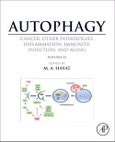Autophagy: Cancer, Other Pathologies, Inflammation, Immunity, Infection, and Aging, Volume 12 discusses and details almost all aspects of the autophagy machinery in the context of health, cancer and other pathologies. Autophagy is more widely accepted as beneficial given its role in eliminating 'toxic assets' and promoting cell viability, hence, it has emerged as a new and potent modulator of disease progression that is both scientifically intriguing and clinically relevant. As the latest release in the Autophagy book series, users will find a detailed explanation of the role of molecular mechanisms.
Please Note: This is an On Demand product, delivery may take up to 11 working days after payment has been received.
Table of Contents
I. MOLECULAR MECHANISMS 1. Overview of Autophagy 2. The Role of Autophagy in Ageing: Molecular Mechanisms 3. The Role of p62 in Aggregopathies 4. Role of Autophagy in the Transition from Monocyte to Differentiation 5. CDC48 AAA ATPASE Regulates Protein Dynamics and Turnover in Mitochondria 6. Autophagy in Plasma Cells 7. Loss of Pink1 or Parkin Function Results in a Progressive Loss of Mitochondrial Function 8. Role of the Transcription Factor IRF-1 in Regulating Autophagy in Lipopolysaccharide Stimulated Macrophages 9. mTOR: The Alpha and Omega of Autophagy Regulation 10. ER-phagy in Starvation, ER Stress, and Quality Control 11. Role of Autophagy Inhibition in Tumor Proliferative Arrest 12. Survival at the Brink: Chromatin Autophagy of Tumour Cells in Response to Genotoxic Challenge 13. Loss of Autophagy in Hypothalmic Neurons May be Involved in the Pathogenesis of Obesity 14. Defective Autophagy in Mesenteric Fat Tissue Maintains Inflammation in Crohn's Disease 15. Autophagy Regulates Inflammatory Responses in Antigen Presenting Cells: Underlying Mechanisms 16. Autophagy Accompanies Inflammasome Activation Moderating Inflammation by Eliminating Active Inflammasomes 17. Autophagy, Inflammation, and Breast Cancer Risk 18. AMBRA-Mediated regulation of V-MYC and its Relevance to Cancer 19. The Delicate Balance of Autophagy in Neurodegeneration 20. Silibinin Protects Uvb-Irradiated Skin by Balancing Apoptosis and Autophagy in Epidermis and Dermis 21. Role of Autophagy Activation in Alleviating Alcohol Neurotoxicity 22. Lipopolysaccharide-Enhanced Bactericidal Activity is Mediated by Induction of the Autophagosomal Process 23. Role of Autophagy in Liver Regeneration 24. A Dual Role of a Soluble N-Ethylmaleimide Sensitive Factor-Attachment Protein Alpha (?-Snap) in the Regulation of Autophagy 25. TRAIL Induces Autophagic Protein Cleavage in Melanoma Cells








